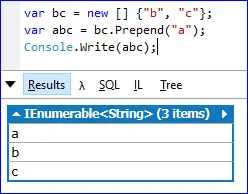例如:
string element = 'a';
IEnumerable<string> list = new List<string>{ 'b', 'c', 'd' };
IEnumerable<string> singleList = ???; //singleList yields 'a', 'b', 'c', 'd'

public static System.Collections.Generic.IEnumerable<TSource> Prepend<TSource> (this System.Collections.Generic.IEnumerable<TSource> source, TSource element);(https://learn.microsoft.com/en-us/dotnet/api/system.linq.enumerable.prepend?view=netcore-2.0) - Niklas Peter